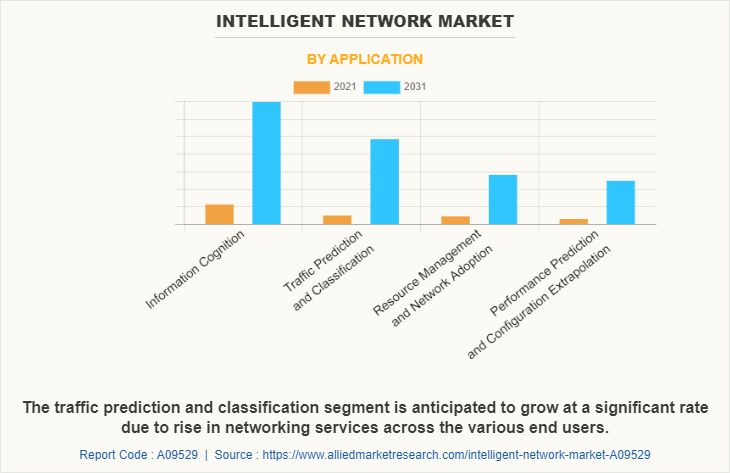Intelligent Network Market Statistics: 2031
The global intelligent network market size was valued at $4.6 billion in 2021, and is projected to reach $34.1 billion by 2031, growing at a CAGR of 22.6% from 2022 to 2031.
An intelligent network is a telecommunication network architecture that allows for greater levels of automation and integration of services, enabling carriers to provide value-added services to their customers. It uses advanced technologies such as artificial intelligence and machine learning to improve network performance, reliability, and scalability. With an intelligent network, service providers can offer customized services, simplify network management, and reduce operational costs. This results in improved customer experience and increased revenue opportunities for the service providers.

The adoption of intelligent networks in telecommunication is driving the intelligent network market growth. Intelligent networks allow for the automation of many network functions, such as call routing and management, enabling operators to quickly and easily introduce new services to customers. Moreover, intelligent networks can provide real-time network information, which is useful for diagnosing and resolving network issues, improving network performance, and reducing downtime. In addition, advancements in artificial intelligence and machine learning and an increase in demand for cloud-based services are positively impacting the market growth. Thus, all these factors drive the growth of the intelligent network market size. However, high deployment costs and cybersecurity issues, and complex integration are hampering the growth of the intelligent network market. On the contrary, the widespread deployment of 5G networks is expected to provide major lucrative opportunities for the growth of the intelligent network industry.
Top Impacting Factors
Adoption of an intelligent network in telecommunication
The adoption of intelligent networks in telecommunication has increased in recent years owing to the growing demand for advanced communication services and increasing efficiency in network management. Moreover, intelligent networks allow for the automation of many network functions, such as call routing and management, enabling operators to quickly and easily introduce new services to customers. In addition, intelligent networks can provide real-time network information, which is useful for diagnosing and resolving network issues, improving network performance, and reducing downtime.
Furthermore, the integration of artificial intelligence and machine learning technologies into intelligent networks has further enhanced their capabilities, allowing for self-optimizing and self-healing networks. Virtualization and SDN technologies are becoming increasingly popular in telecommunication, as they enable more efficient network management and help to reduce costs. These factors drive the growth of the intelligent network market.
Advancements in artificial intelligence and machine learning
The integration of AI and machine learning into intelligent networks is allowing for more intelligent network management, self-optimization, and improved network performance. AI and ML algorithms are being used to optimize and manage networks in real-time, improving network performance and reducing downtime. Moreover, the growing demand for advanced communication services, such as high-speed data transfer, multimedia services, and IoT applications, is driving the need for intelligent networks that can support these services effectively. In addition, the integration of AI and machine learning into intelligent networks is allowing for more intelligent network management, self-optimization, and improved network performance.
Furthermore, AI and ML algorithms can be used to detect and prevent security threats in real-time, improving network security and reducing the risk of security breaches. Therefore, the integration of AI and ML into intelligent networks is enabling more intelligent network management and improved network performance, as well as providing new and innovative services to customers. These advancements are contributing to the growth of the intelligent network market.
Increase in demand for cloud-based services
The adoption of cloud-based services is driving the growth of the intelligent network market, as operators look to improve network performance, reduce costs, and provide new and innovative services to customers. Cloud-based services provide operators with the ability to scale their networks up or down as needed, allowing them to better manage network resources and reduce costs. Moreover, it allows operators to implement and manage new services and applications more quickly and easily, improving network agility, and enabling new revenue streams. In addition, cloud-based services provide a more cost-effective solution compared to traditional on-premises solutions, as they eliminate the need for capital expenditures and provide pay-as-you-go pricing models. Furthermore, the shift towards cloud-based services is driving the need for intelligent networks that can support and manage cloud-based services efficiently.
High deployment costs and data technical limitations
The deployment of intelligent network solutions can be expensive, as they require a significant investment in hardware, software, and personnel. This high cost of deployment may prevent operators from adopting these solutions, especially smaller operators with limited budgets. Moreover, intelligent network solutions may be limited by current technical capabilities, such as the lack of real-time data processing and analysis capabilities, which can impact network performance. In addition, integrating these solutions into existing network infrastructure can be complex and time-consuming, requiring significant technical expertise and resources. Furthermore, these restraints can slow down the growth of the intelligent network market, as operators must weigh the benefits of adoption against the costs and risks associated with implementation.
Cybersecurity issues and complex integration
Cybersecurity issues and complex integration are two of the main restraints that may impact the growth of the intelligent network market. The increase in the use of artificial intelligence (AI) and machine learning (ML) in intelligent networks has raised concerns over data privacy and security. Operators need to ensure that intelligent network solutions are secure and protect against cyber threats, such as hacking, data theft, and network outages.
Moreover, integrating intelligent network solutions into existing network infrastructure can be complex and time-consuming, requiring significant technical expertise and resources. This complexity can lead to challenges in deployment, management, and maintenance, which can impact network performance and increase costs. In addition, lack of proper guidance for the usage of intelligent network and complex integration of network architecture are the major restraining factor that hinders the growth of the intelligent network market.
Widespread deployment of 5G networks
The widespread deployment of 5G networks is a key opportunity for the intelligent network market. 5G networks offer several benefits over previous generations of mobile networks, including increased speed, reduced latency, and support for new and innovative services and use cases, such as IoT, autonomous vehicles, and virtual reality. Moreover, with the deployment of 5G networks, there will be a growing need for intelligent network solutions to support the new and complex network infrastructure required for 5G. Intelligent networks will enable operators to optimize network performance, reduce downtime, and improve customer experience.
In addition, the increase in data processing and analysis capabilities supported by 5G networks is anticipated to create new opportunities for intelligent networks to automate network operations, improve network performance, and provide new and innovative services to customers. Furthermore, the widespread deployment of 5G networks is expected to drive significant growth in the intelligent network market in the upcoming years, as operators look to take advantage of intelligent network architecture and innovative technologies to improve network performance and provide new and innovative services to customers.
Segment Review
The intelligent network market is segmented on the basis of application, enterprise size, and end user. By application, it is segmented into information cognition, traffic prediction and classification, resource management and network adoption, and performance prediction and configuration extrapolation. By enterprise size, it is segmented into large enterprise and small and medium enterprise. By end user, it is bifurcated into telecom service providers, cloud service providers, managed network service providers, and others. By region, it is analyzed across North America, Europe, Asia-Pacific, and LAMEA.

Based on application, the information cognition segment accounted for the highest growth in intelligent network industry in 2021. This is attributed to the increase in the need for information detection to collect network operational data including traceroute, network characteristics, traffic matrix, and other basic functions. However, the traffic prediction and classification segment is expected to register the highest growth rate in the intelligent network market forecast owing to its popularity to assist in the detection of network threats, resource management, or enhancement of the caliber of network services.

Based on region, North America accounted for the highest growth in intelligent network market share in 2021. This is attributed due to the presence of industry players with best-in-class network technologies and services to offer. Moreover, the rise in 5G networks and IoT devices across the region is boosting market growth. However, Asia-Pacific is expected to register the highest growth rate during the forecast period due to rapid advancements in telecommunication technologies and the presence of a number of SMEs in the region.
Market Landscape and Trends
The intelligent network market is a rapidly growing industry, driven by the increase in demand for more efficient and sustainable shipping operations. The use of technologies such as IoT, AI, and blockchain is becoming more widespread in the maritime industry, as companies look to improve efficiency and reduce costs. Moreover, the adoption of digital platforms for supply chain management is expected to continue to grow as they improve transparency and efficiency in logistics operations. In addition, with the growing emphasis on sustainability, the maritime industry is focusing on reducing its carbon footprint and using sustainable energy sources.
Furthermore, the intelligent network market is expected to continue to grow in the future as more companies and organizations adopt these technologies to improve efficiency, reduce costs and enhance safety and security in the maritime industry while being more sustainable. Therefore, these are the major market trends for the market.
Key Benefits for Stakeholders
- This report provides a quantitative analysis of the market segments, current trends, estimations, and dynamics of the intelligent network market analysis from 2021 to 2031 to identify the prevailing intelligent network market opportunities
- The market research is offered along with information related to key drivers, restraints, and opportunities
- Porter's five forces analysis highlights the potency of buyers and suppliers to enable stakeholders to make profit-oriented business decisions and strengthen their supplier-buyer network
- An in-depth analysis of the intelligent network market segmentation assists to determine the prevailing market opportunities
- Major countries in each region are mapped according to their revenue contribution to the global market
- Market player positioning facilitates benchmarking and provides a clear understanding of the present position of the market players
- The report includes an analysis of the regional as well as global intelligent network market trends, key players, market segments, application areas, and market growth strategies
Intelligent Network Market Report Highlights
| Aspects | Details |
| Market Size By 2031 | USD 34.1 billion |
| Growth Rate | CAGR of 22.6% |
| Forecast period | 2021 - 2031 |
| Report Pages | 220 |
| By Application |
|
| By Enterprise Size |
|
| By End User |
|
| By Region |
|
| Key Market Players | Tech Mahindra Limited., Juniper Networks, Inc., Netcracker, Nokia Corporation, Colt Technology Services Group Limited, Cisco Systems, Inc., Aruba Networks, Huawei Technologies Co., Ltd., Orange, Telefonaktiebolaget LM Ericsson |
Analyst Review
Intelligent network allows functionality to be distributed flexibly at a variety of nodes on and off the network and allows the architecture to be modified to control the services. These networks can separate extra services from the call switching system, making it easier to add new user services. Intelligent network technology consists of remotely manageable and automatically adjusting broadband nodes and amplifiers, as well as their management software. They have been designed to help operators improve the quality of service while keeping operational costs in control.
Furthermore, market players are adopting strategies such as acquisition for enhancing their services in the market and improving customer satisfaction. For instance, in August 2022, Juniper Networks, a leader in secure, AI-driven networks, announced new Network as a Service (NaaS) enhancements to their leading AIOps platform that further facilitate the deployment and management of wired, wireless, and secure SD-WAN network services via Juniper MSP and reseller partners. This product launch helped both the companies to boost their market share in terms of revenue and attract more customers.
Some of the key players profiled in the report include Aruba Networks, Cisco Systems, Inc., Colt Technology Services Group Limited, Huawei Technologies Co., Ltd., Juniper Networks, Inc., Netcracker, Nokia Corporation, Orange, Tech Mahindra Limited, and Telefonaktiebolaget LM Ericsson. These players have adopted various strategies to increase their market penetration and strengthen their position in the intelligent network market.
The global intelligent network market was valued at $4,564.52 million in 2021, and is projected to reach $34,105.82 million by 2031, registering a CAGR of 22.6% from 2022 to 2031.
Adoption of intelligent network in telecommunication, advancements in artificial intelligence and machine learning, and an increase in demand for cloud-based services are major growth factors for the market.
North America is the largest regional market for Intelligent Network.
Aruba Networks, Cisco Systems, Inc., Colt Technology Services Group Limited, Huawei Technologies Co., Ltd., Juniper Networks, Inc., Netcracker, Nokia Corporation, Orange, Tech Mahindra Limited, and Telefonaktiebolaget LM Ericsson are the top companies to hold the market share in Intelligent Network market.
The key growth strategies for digital media production software market include product portfolio expansion, acquisition, partnership, merger, and collaboration.
Loading Table Of Content...


